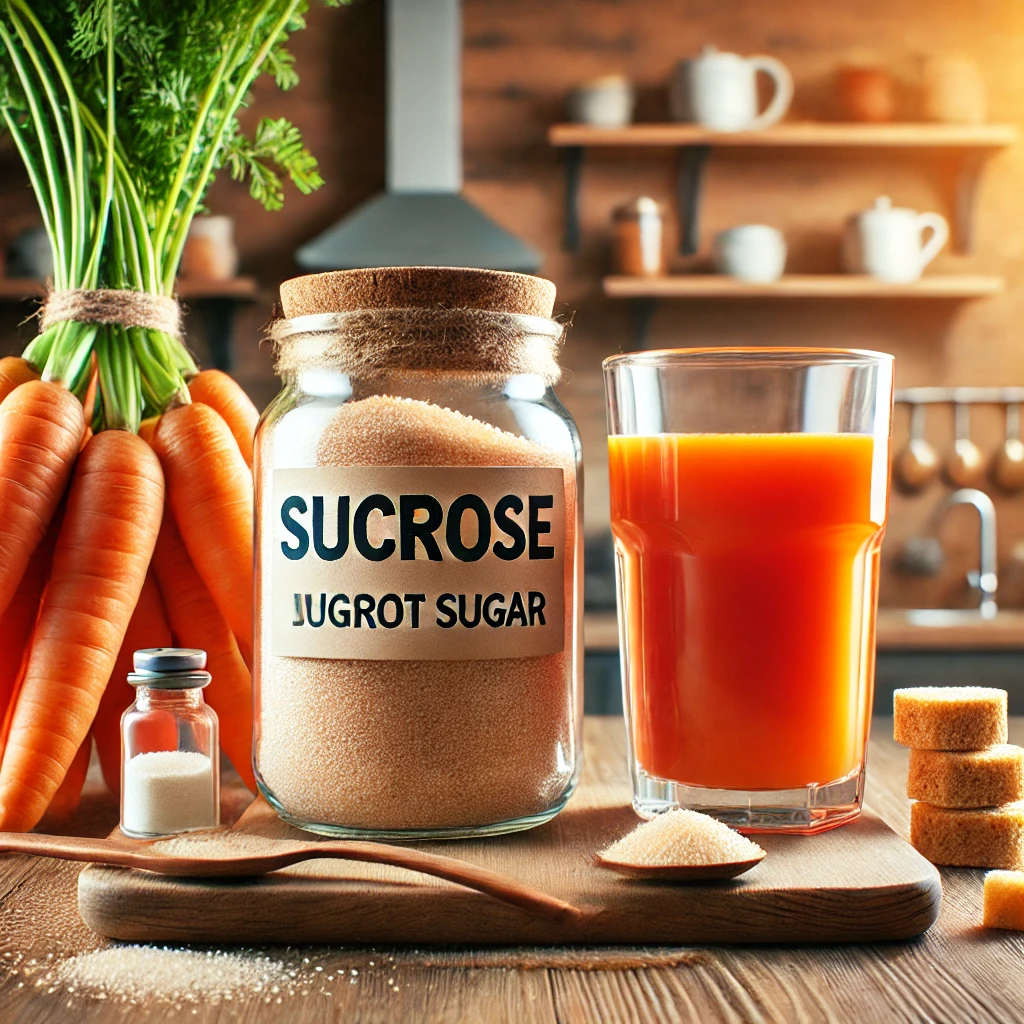Carrots are a popular vegetable known for their vibrant color, crunchy texture, and high nutritional value. One aspect often overlooked is the natural sugar content in carrots, which can have unique effects on the body. The primary sugar found in carrots is sucrose (C12H22O11), a disaccharide composed of glucose and fructose. In this article, we’ll explore how carrot sugar is processed in the body, its benefits for workouts, its implications for diabetes management, and how carrot juice compares to other juices like orange, apple, and pomegranate for people with diabetes.
How Carrot Sugar is Processed in the Body
Carrots contain natural sugars, primarily sucrose, glucose, and fructose, which are classified as simple carbohydrates. Here’s how these sugars are broken down and utilized:
- Digestion: Carrot sugars are quickly digested in the small intestine, where enzymes break them down into glucose and fructose.
- Absorption: Glucose enters the bloodstream, causing a moderate increase in blood sugar levels, while fructose is metabolized primarily in the liver.
- Energy Utilization: Cells absorb glucose with the help of insulin, providing immediate energy or storing it as glycogen in muscles and the liver.
- Non-Glucose Conversion: Fructose, unlike glucose, does not directly raise blood sugar. Instead, it is converted into glucose, lactate, or stored as fat in the liver, making it a slower and more sustained energy source.

Carrots have a relatively low glycemic index (GI) of around 35–45, meaning they cause a gradual rise in blood sugar levels compared to high-GI foods. This makes carrots a suitable option for maintaining steady energy levels.
Additional Functions of Sucrose in the Body
Sucrose serves several important roles beyond providing immediate energy:
- Energy Reservoir: It acts as a quick source of glucose when the body needs immediate energy.
- Metabolic Balance: Sucrose supports metabolic pathways by balancing glucose and fructose utilization.
- Stress Recovery: During stress or exercise, sucrose can replenish glycogen stores rapidly, aiding recovery.
- Flavor Enhancement: It naturally enhances the taste of foods, encouraging dietary intake in individuals with poor appetites.
- Slow Energy Release: The dual-component nature of sucrose (glucose and fructose) allows for both quick and sustained energy.
Benefits of Carrot Sugar for Workouts
Carrots can be an excellent addition to a pre- or post-workout meal due to their carbohydrate content and nutrient density. Here’s why:
- Energy Source: The natural sugars in carrots provide a quick but sustained source of energy, ideal for fueling workouts.
- Electrolyte Balance: Carrots are rich in potassium, which helps maintain electrolyte balance during exercise.
- Recovery Support: The antioxidants in carrots, including beta-carotene, reduce oxidative stress caused by intense physical activity.
- Hydration: Carrots have a high water content, contributing to overall hydration.
- Glycogen Replenishment: The glucose from sucrose rapidly restores glycogen levels in muscles after exercise.

Benefits of Carrot Sugar for Diabetes Management
Despite their natural sugar content, carrots can be beneficial for people with diabetes due to their low GI and high fiber content. Here’s how they help:
- Stable Blood Sugar Levels: The fiber in carrots slows down the absorption of sugars, preventing sharp blood sugar spikes.
- Improved Insulin Sensitivity: Carrots contain antioxidants like carotenoids, which have been linked to improved insulin sensitivity.
- Weight Management: As a low-calorie and nutrient-dense food, carrots support weight management, which is crucial for diabetes control.
- Heart Health: The potassium and antioxidants in carrots contribute to cardiovascular health, reducing diabetes-related complications.
- Liver Support: Fructose from sucrose is metabolized in the liver, reducing the immediate burden on insulin secretion.
Carrot Juice for Diabetes: How Does It Compare?
Carrot juice is a popular beverage, but how does it fare for people with diabetes compared to other fruit juices like orange, apple, and pomegranate juice?
Carrot Juice
- Pros: Low in calories, moderate in natural sugars, rich in beta-carotene, potassium, and antioxidants.
- Cons: Lacks the fiber of whole carrots, which can lead to quicker absorption of sugars.
Orange Juice
- Pros: High in vitamin C and potassium, supports immune function.
- Cons: Higher glycemic index and sugar content compared to carrot juice.
Apple Juice
- Pros: Contains polyphenols and antioxidants.
- Cons: High in fructose and calories, which may not be ideal for blood sugar management.
Pomegranate Juice
- Pros: Rich in antioxidants, particularly punicalagins, which support heart health.
- Cons: Higher sugar content than carrot juice, although it has a low glycemic load.
Conclusion: For people with diabetes, carrot juice is generally a better choice compared to orange and apple juices due to its lower sugar content and glycemic impact. While pomegranate juice offers unique health benefits, it should be consumed in moderation. Whole carrots remain the superior option because of their fiber content.
Expanded Benefits of Carrot Sugar
- Antioxidant Boost: Beta-carotene in carrots combats free radicals, reducing inflammation and oxidative stress.
- Eye Health: The vitamin A derived from beta-carotene supports vision and prevents age-related macular degeneration.
- Digestive Health: The fiber in carrots promotes healthy digestion and gut microbiome balance.
- Immune Support: Vitamins and antioxidants in carrots bolster the immune system.
- Skin Health: Carrots improve skin tone and reduce the risk of UV damage through antioxidants.
Conclusion
Carrots and their natural sugars provide numerous health benefits, from supporting workouts to aiding in diabetes management. Whether consumed raw, cooked, or as juice, carrots can be a valuable part of a balanced diet. The dual energy release from sucrose enhances both immediate and sustained energy needs, making carrots suitable for diverse dietary goals. For individuals with diabetes, carrot juice offers a lower-sugar alternative to other fruit juices, making it a practical choice for maintaining stable blood sugar levels. Always consult a healthcare professional before making significant dietary changes, especially if you have diabetes or other health conditions.










